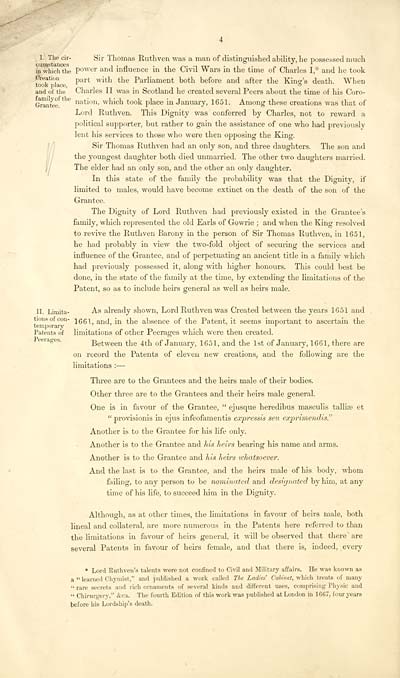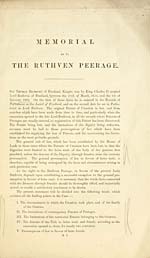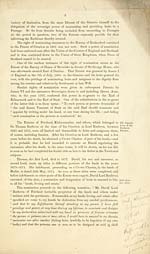Memorial as to the Ruthven peerage
(8) Page 4
Download files
Complete book:
Individual page:
Thumbnail gallery: Grid view | List view

I. The cir- Sir Thomas Ruthven was a man of distinguished ability, he possessed much
in which the power and influence in the Civil Wars in the time of Charles I * and he took
Creation part ^^ the Parliament both before and after the Kind's death. When
took place, * ■=>
and of the Charles II was in Scotland he created several Peers about the time of his Coro-
Grantee * ^ nat i° n > which took place in January, 1651. Among these creations was that of
Lord Ruthven. This Dignity was conferred by Charles, not to reward a
political supporter, but rather to gain the assistance of one who had previously
lent his services to those who were then opposing the King.
Sir Thomas Ruthven had an only son, and three daughters. The son and
the youngest daughter both died unmarried. The other two daughters married.
The elder had an only son, and the other an only daughter.
In this state of the family the probability was that the Dignity, if
limited to males, would have become extinct on the death of the son of the
Grantee.
The Dignity of Lord Ruthven had previously existed in the Grantee's
family, which represented the old Earls of Gowrie ; and when the King resolved
to revive the Ruthven Barony hi the person of Sir Thomas Ruthven, in 1651,
he had probably in view the two-fold object of securing the services and
influence of the Grantee, and of perpetuating an ancient title in a family which
had previously possessed it, along with higher honours. This could best be
done, in the state of the family at the time, by extending the limitations of the
Patent, so as to include heirs general as well as heirs male.
II. Limita- As already shown, Lord Ruthven was Created between the years 1651 and
tionsof con- iqq\ anc i J n the absence of the Patent, it seems important to ascertain the
temporary ' .
Patents of limitations of other Peerages which were then created.
-rages. Between the 4th of January, 1651, and the 1st of January, 1661, there are
on record the Patents of eleven new creations, and the following are the
limitations : —
Three are to the Grantees and the heirs male of their bodies.
Other three are to the Grantees and their heirs male general.
One is in favour of the Grantee, " ej usque heredibus masculis tallise et
" provisionis in ejus infeofamentis expressis seu exprimendis."
Another is to the Grantee for his life only.
Another is to the Grantee and his heirs bearing his name and arms.
Another is to the Grantee and his heirs whatsoever.
And the last is to the Grantee, and the heirs male of his. body, whom
failing, to any person to be nominated and designated by him, at any
time of his life, to succeed him in the Dignity.
Although, as at other times, the limitations in favour of heirs male, both
lineal and collateral, are more numerous in the Patents here referred to than
the limitations in favour of heirs general, it will be observed that there are
several Patents in favour of heirs female, and that there is, indeed, every
* Lord Ruthven's talents were not confined to Civil and Military affairs. He was known as
a " learned Chymist," and published a work called The Ladies' Cabinet, which treats of many
" rare secrets and rich ornaments of several kinds and different uses, comprising Physic and
" Chirurgery," &ca. The fourth Edition of this work was published at London in 1667, four years
before his Lordship's death.
in which the power and influence in the Civil Wars in the time of Charles I * and he took
Creation part ^^ the Parliament both before and after the Kind's death. When
took place, * ■=>
and of the Charles II was in Scotland he created several Peers about the time of his Coro-
Grantee * ^ nat i° n > which took place in January, 1651. Among these creations was that of
Lord Ruthven. This Dignity was conferred by Charles, not to reward a
political supporter, but rather to gain the assistance of one who had previously
lent his services to those who were then opposing the King.
Sir Thomas Ruthven had an only son, and three daughters. The son and
the youngest daughter both died unmarried. The other two daughters married.
The elder had an only son, and the other an only daughter.
In this state of the family the probability was that the Dignity, if
limited to males, would have become extinct on the death of the son of the
Grantee.
The Dignity of Lord Ruthven had previously existed in the Grantee's
family, which represented the old Earls of Gowrie ; and when the King resolved
to revive the Ruthven Barony hi the person of Sir Thomas Ruthven, in 1651,
he had probably in view the two-fold object of securing the services and
influence of the Grantee, and of perpetuating an ancient title in a family which
had previously possessed it, along with higher honours. This could best be
done, in the state of the family at the time, by extending the limitations of the
Patent, so as to include heirs general as well as heirs male.
II. Limita- As already shown, Lord Ruthven was Created between the years 1651 and
tionsof con- iqq\ anc i J n the absence of the Patent, it seems important to ascertain the
temporary ' .
Patents of limitations of other Peerages which were then created.
-rages. Between the 4th of January, 1651, and the 1st of January, 1661, there are
on record the Patents of eleven new creations, and the following are the
limitations : —
Three are to the Grantees and the heirs male of their bodies.
Other three are to the Grantees and their heirs male general.
One is in favour of the Grantee, " ej usque heredibus masculis tallise et
" provisionis in ejus infeofamentis expressis seu exprimendis."
Another is to the Grantee for his life only.
Another is to the Grantee and his heirs bearing his name and arms.
Another is to the Grantee and his heirs whatsoever.
And the last is to the Grantee, and the heirs male of his. body, whom
failing, to any person to be nominated and designated by him, at any
time of his life, to succeed him in the Dignity.
Although, as at other times, the limitations in favour of heirs male, both
lineal and collateral, are more numerous in the Patents here referred to than
the limitations in favour of heirs general, it will be observed that there are
several Patents in favour of heirs female, and that there is, indeed, every
* Lord Ruthven's talents were not confined to Civil and Military affairs. He was known as
a " learned Chymist," and published a work called The Ladies' Cabinet, which treats of many
" rare secrets and rich ornaments of several kinds and different uses, comprising Physic and
" Chirurgery," &ca. The fourth Edition of this work was published at London in 1667, four years
before his Lordship's death.
Set display mode to:
![]() Universal Viewer |
Universal Viewer | ![]() Mirador |
Large image | Transcription
Mirador |
Large image | Transcription
Images and transcriptions on this page, including medium image downloads, may be used under the Creative Commons Attribution 4.0 International Licence unless otherwise stated. ![]()
| Histories of Scottish families > Memorial as to the Ruthven peerage > (8) Page 4 |
|---|
| Permanent URL | https://digital.nls.uk/95642527 |
|---|
| Description | A selection of almost 400 printed items relating to the history of Scottish families, mostly dating from the 19th and early 20th centuries. Includes memoirs, genealogies and clan histories, with a few produced by emigrant families. The earliest family history goes back to AD 916. |
|---|

